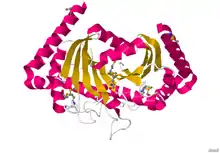MotB
Motility protein B also known as MotB is a bacterial protein that is encoded by the motB gene. It's a component of the flagellar motor.[2] More specifically, MotA and MotB makes the stator of a flagellum and surround the rotor as a ring of about 8-10 particles. MotA and MotB are integral membrane proteins.[3] While both MotA and MotB surround the MS ring, MotB also anchors MotA to cell wall peptidoglycan. These two proteins form pores that harvest energy for flagellar mechanical movement by proton motive force (PMF) across the membrane. Cellular metabolic processes such as the electron transport chain move protons outside the cell, creating more protons and more positive charge in the extracellular space. When the protons flow back into the cell through MotA and MotB along concentration and charge gradients, they release energy that is used for flagellar rotation. The speed of the flagellar motor is dependent on the magnitude of the PMF acting on MotA and MotB.[4]
| Motility protein B | |||||||
|---|---|---|---|---|---|---|---|
 Structure of the periplasmic domain of MotB from Salmonella.[1] | |||||||
| Identifiers | |||||||
| Organism | |||||||
| Symbol | motB | ||||||
| Entrez | 946402 | ||||||
| RefSeq (Prot) | NP_416403 | ||||||
| UniProt | P0AF06 | ||||||
| Other data | |||||||
| Chromosome | chromosome: 1.97 - 1.97 Mb | ||||||
| |||||||
See also
- MotA - MotA and MotB make the stator
- PomA - protein that is part of the stator in Na+
- PomB - protein that is part of the stator in Na+
- Integral membrane protein a type of membrane protein
- Archaellum
- Cilium
- Ciliopathy
- Rotating locomotion in living systems
- Undulipodium
References
- PDB: 2ZVZ; Kojima S, Imada K, Sakuma M, et al. (August 2009). "Stator assembly and activation mechanism of the flagellar motor by the periplasmic region of MotB". Mol. Microbiol. 73 (4): 710–8. doi:10.1111/j.1365-2958.2009.06802.x. PMID 19627504.
- Stader J, Matsumura P, Vacante D, Dean GE, Macnab RM (April 1986). "Nucleotide sequence of the Escherichia coli motB gene and site-limited incorporation of its product into the cytoplasmic membrane". J. Bacteriol. 166 (1): 244–52. PMC 214583. PMID 3007435.
- Stolz B, Berg HC (November 1991). "Evidence for interactions between MotA and MotB, torque-generating elements of the flagellar motor of Escherichia coli". J. Bacteriol. 173 (21): 7033–7. PMC 209062. PMID 1938906.
- Willey J (2009). Prescott's Principles of Microbiology. New York, NY: McGraw-Hill. pp. 57–58. ISBN 978-0-07-337523-6.
Further reading
- Eisenbach M, Lengeler JW, Varon M, Gutnick D, Firtel FA, Omann GM, Tamada A, Murakami F (2004). Chemotaxis. River Edge, N.J: Imperial College Press. ISBN 1-86094-413-2.
- Stackebrandt E, Dworkin M, Falkow S, Rosenberg E, Schleifer KH (2006). The prokaryotes: a handbook on the biology of bacteria. Berlin: Springer. ISBN 0-387-25476-5.